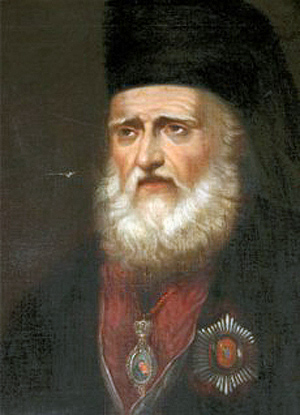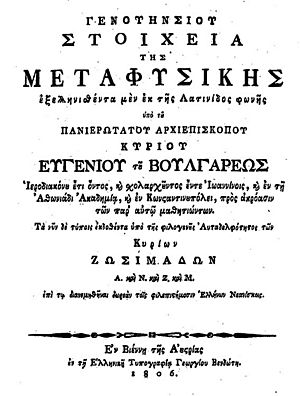Eugenios Voulgaris facts for kids
Quick facts for kids Eugenios Voulgaris |
|
|---|---|
| Archbishop of Cherson | |
 |
|
| Personal details | |
| Born | 1716 Corfu, Republic of Venice |
| Died | 1806 Saint Petersburg, Russian Empire |
Eugenios Voulgaris (born Eleftherios Vulgares) was a very smart and important Greek man who lived a long time ago, from 1716 to 1806. He was an Orthodox church leader, but also a writer, teacher, mathematician, astronomer, physicist, and philosopher! He wrote about many different subjects, like law, history, religion, and even the tides.
Eugenios Voulgaris also wrote speeches, poems, and hundreds of letters. He helped publish important old books and translated many texts from Latin into French. He was a key figure in the Modern Greek Enlightenment, a time when new ideas and learning spread across Greece. He even became a bishop in Kherson (in Crimea).
Contents
Early Life and Learning
Eugenios Voulgaris was born on August 10, 1716, on the island of Corfu. At that time, Corfu was ruled by the Republic of Venice. He first studied in Corfu with a scholar named Vikentios Damodos. Later, he continued his studies at the School of Ioannina in western Greece.
Around 1737 or 1738, he became a monk and a priest, taking the name Eugenios. After that, he went to the University of Padua in Italy. There, he studied many things, including religion, philosophy, European languages, and natural sciences.
A Teacher for Greece
In 1742, Eugenios Voulgaris became the head of an important school in Ioannina called the Maroutsaia. He had a public debate with another school director, Balanos Vasilopoulos. Eugenios wanted to teach natural philosophy, which was a new idea at the time.
From 1753 to 1759, Voulgaris led the Athonite Academy at Vatopedi Monastery. He wanted to improve the quality of studies there. He taught philosophy and mathematics. Even though he was a great teacher, some Orthodox Christian leaders on Mount Athos didn't like his new ideas from the Western European 'Enlightenment'. Because of this, he had to leave the school in 1759.
He then briefly led the Patriarchal Academy in Constantinople, also known as the "Great School of the Nation." However, in 1761, he stopped his teaching career for good.
Life in Russia
After his teaching efforts didn't quite work out in Greece, Eugenios Voulgaris accepted an invitation from the Russian Empress Catherine II. He spent the rest of his life in Russia. In 1763, he traveled to Leipzig and Berlin at the Empress's request.
In 1771, he arrived in St. Petersburg. From 1772 to 1774, he worked as a librarian at the Empress's court.
In 1775, he became an archbishop. He was the first archbishop of a new church area called the Eparchy of Slaviansk and Cherson. This new area was in lands that Russia had recently won from the Ottoman Empire. Many Orthodox Greeks were invited to live there. The Russian government thought it was a good idea to have a Greek-speaking bishop for them.
His main church was not in Slaviansk or Cherson, but in Poltava. The Monastery of the Exaltation of the Cross became his home. In 1776, he invited another man from Corfu, Nikephoros Theotokis, to join him in Poltava. Eugenios trained Nikephoros to take over his role. In 1779, Eugenios retired, but he stayed in the same monastery while Nikephoros became the new bishop.
In 1787, Voulgaris was allowed to move to St. Petersburg. From 1801 until he died, he lived in the Alexander Nevsky Lavra. In 1788, he became a member of the Royal Society, a famous group of scientists.
He passed away on June 12, 1806, and was buried in St. Petersburg.
Orthodox Faith and New Ideas
In the 1700s, Orthodox Christians in Greece were starting to face new ideas from Western Europe, especially about learning and science. Eugenios Voulgaris was one of the most important Greek writers during this time. He was a very strict Orthodox Christian, but he tried to share the ideas of the Western European Enlightenment with Greek Orthodox people. He did this by translating and teaching the works of thinkers like John Locke, Voltaire, and Christian Wolff.
Voulgaris believed that to improve learning in Orthodox Christian society, people should still study classic texts. But they should also learn about modern European philosophy.
The Greek Language Debate
Towards the end of the 1700s, people in Greece started to debate about the Greek language. Western Europeans admired ancient Greek. So, Eugenios Voulgaris and others suggested that modern Greek should become more like Ancient Greek.
However, some of his students preferred to use the everyday language that had developed, called Dimotiki. This discussion became very important later when Greece became a country and had to decide what its official language would be.
Another scholar, Adamantios Korais, also joined this debate. He supported the language people spoke every day. But he wanted to "clean it up" from words he thought were too common. He created a style called Katharevousa, which was somewhere between ancient and modern Greek.
His Writings
Eugenios Voulgaris wrote many books and translated others. Here are some of his important works:
- Logic (published in Leipzig, 1766)
- Treatise on Religious Toleration (1767)
- Elements of Metaphysics (published in Venice, 1805)
- What Philosophers Prefer (published in Vienna, 1805)
- About the Universe (published in Vienna, 1805)
He also translated works by famous thinkers like:
- John Locke (1632–1704)
- Christian Wolff (1679–1754)
- Voltaire (1694–1778)
- Du Hamel (1624–1706)
- Edmond Pourchot (1651–1734)
See also
- Diafotismos
- Age of Enlightenment
 | Jessica Watkins |
 | Robert Henry Lawrence Jr. |
 | Mae Jemison |
 | Sian Proctor |
 | Guion Bluford |


